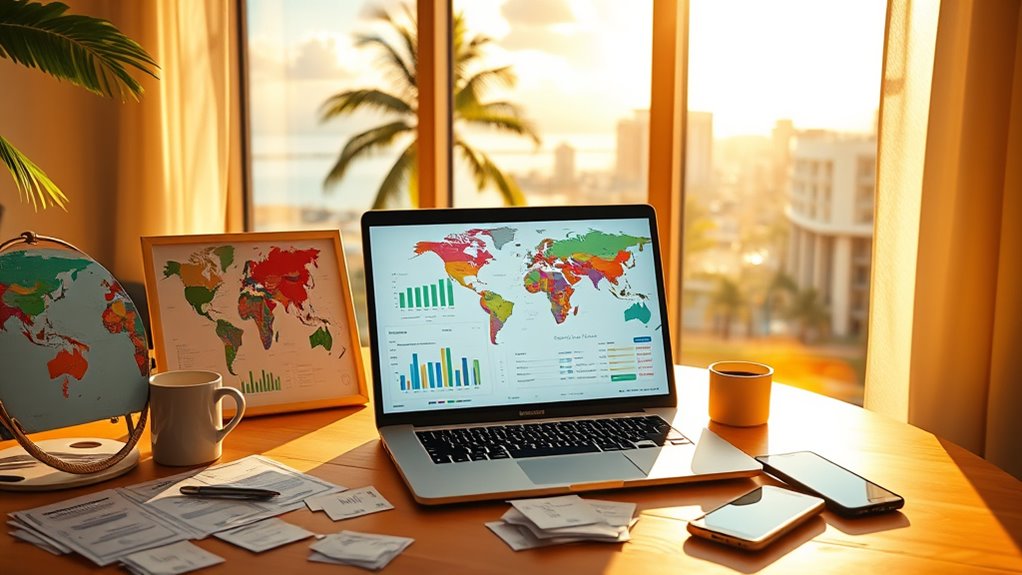To manage your finances as a digital nomad, focus on diversifying your income streams—such as remote jobs, freelancing, and entrepreneurship—to stay stable. Budget carefully for accommodation, travel, and daily expenses, and use digital tools like international bank accounts and currency exchange platforms to minimize fees. Keep track of tax laws and visa requirements in each country to stay compliant. If you want to learn more about optimizing your money management while abroad, you’ll find useful strategies below.
Key Takeaways
- Diversify income sources like remote jobs, freelancing, and entrepreneurship to ensure financial stability abroad.
- Use digital banking and currency exchange platforms to minimize fees and manage multi-currency finances efficiently.
- Establish a clear budget covering accommodation, travel, insurance, and leisure to maintain financial health.
- Understand tax obligations and visa requirements in host countries to avoid legal issues and optimize earnings.
- Invest in financial tools and professional growth to maximize earning potential and streamline money management.

Ever wondered how digital nomads manage their finances while traveling the world? It’s a combination of strategic planning, smart money management, and leveraging the right financial tools. On average, digital nomads earn about $124,000 a year, with many comfortably making over $75,000. This income range provides a good foundation for traveling freely, but it also demands careful budgeting and financial discipline. While some earn less than $25,000, most earn over $50,000, which allows for a comfortable lifestyle if managed wisely. Your income might come from various sources—full-time remote roles, freelancing, or entrepreneurship—and understanding where your money is coming from can help you optimize your financial plan.
Most digital nomads report high satisfaction with their income and lifestyle, which underscores the importance of aligning your earnings with your expenses. Having a diversified income stream, whether from a full-time job, freelance gigs, or running your own business, can help stabilize your finances. Many spend their earnings on reinvestment into their skills and businesses, emphasizing long-term stability over short-term savings. To make the most of your income, consider location choices carefully. Countries with a lower cost of living can stretch your earnings further, allowing you to enjoy a higher quality of life without overspending. This strategic location selection is essential to maintaining a balanced budget while exploring new places.
Remote work reduces many traditional expenses like commuting or office costs, increasing your disposable income. Still, managing your expenses is essential. You should establish a clear budget that accounts for accommodation, food, insurance, and other essentials, while leaving room for travel and leisure. Digital tools like banking apps, expense trackers, and currency exchange platforms can simplify managing your money across countries. Many digital nomads also utilize international banking solutions that minimize fees and offer favorable exchange rates, helping to maximize their earnings. The growth of digital infrastructure and international banking options further facilitates seamless financial management for nomads. Additionally, understanding financial regulations and compliance in your host country can help you avoid unexpected legal issues and fines.
Tax planning becomes critical, especially since approximately 69 countries now offer digital nomad visas, providing legal residence options. These visas often come with specific tax implications, so understanding your tax obligations in your host country and home country can prevent surprises. Some digital nomads choose to establish residency or invest in tax-efficient strategies to optimize their income. Remember, your earning potential depends heavily on your skills—especially in tech and creative fields—so investing in your professional growth can boost your income and financial security.
Frequently Asked Questions
How Can Digital Nomads Optimize International Tax Obligations?
You can optimize your international tax obligations by researching tax treaties between your home country and your destination. Keep detailed records of your income and expenses, and consider working with a tax professional experienced in cross-border issues. Use foreign tax credits or exemptions where applicable, and stay compliant with local laws. Planning ahead and staying informed helps you minimize taxes and avoid penalties while enjoying your nomadic lifestyle.
What Are the Best Tools for Managing Multiple Currencies?
Managing multiple currencies is like juggling balls in the air—you need the right tools to keep everything steady. You should use apps like Wise or Revolut, which let you hold and exchange currencies at real exchange rates with low fees. These platforms also offer multi-currency accounts, making it easier to track and spend money across different countries without headaches. They’re your best allies for international financial peace of mind.
How Do Digital Nomads Access Reliable Health Insurance Abroad?
You can access reliable health insurance abroad by exploring international plans from providers like Cigna, Allianz, or Bupa, which cater specifically to expats and digital nomads. Compare coverage options, costs, and network availability before purchasing. Many insurers let you buy short-term or annual policies online, giving you flexibility. Make sure your plan covers emergencies, hospital stays, and your specific health needs, so you’re protected wherever you travel.
What Are Effective Ways to Save on Transaction Fees?
You can save on transaction fees by using a multi-currency account or a travel-focused debit card that offers free or low-cost international transactions. Always compare the fees before choosing a provider, and consider withdrawing larger amounts to reduce frequency. Additionally, use local currency for purchases whenever possible, and avoid dynamic currency conversion options, which often carry extra charges. These strategies help you keep more of your money when traveling abroad.
How Can Remote Workers Build an Emergency Fund While Traveling?
You can start building an emergency fund by setting aside a small percentage of your income regularly, even if it’s just a few dollars each week. Open a separate high-yield savings account to keep your emergency savings accessible yet separate from daily expenses. Use automatic transfers to stay consistent, and prioritize saving before splurging on travel treats. This way, you’ll steadily grow your safety net for unexpected expenses on the road.
Conclusion
As you settle into your new surroundings, managing your finances becomes second nature, like the gentle hum of a bustling street. With a few smart tips, you’ll find your money flows effortlessly, supporting your adventures and dreams. Remember, every coin saved is a step closer to that sunset view or cozy café you’ve imagined. Embrace the journey, knowing your financial footing is steady—ready to turn everyday moments into unforgettable memories.









